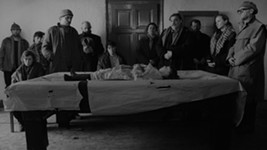Book Review: Readings
Chris Ayres
Reviewed by Spencer Parsons, Fri., Sept. 2, 2005

War Reporting for Cowards
by Chris Ayres
Atlantic Monthly Press, 240 pp., $23
The siren from the logo of a certain ubiquitous coffee chain proves a harsh mistress in War Reporting for Cowards, Chris Ayres' funny and frightening memoir of his brief tenure as an unwilling, unwitting embed for Rupert Murdoch's London Times in the early, pre-Mission Accomplished days of the war in Iraq. A taunting mirage one moment, a figure of judgement the next, that too-familiar mermaid hangs balefully over the action, simultaneously representing a creature comfort missed by the author and his unit of Marines and the cause they're fighting for. "I'm thinkin' of buying myself an Iraqi retirement home," dreams one soldier under glittering stars as bombs thud and pop in the distance. "Either that or I'm gonna open the first goddamn Starbucks in Baghdad."Studiously neither pro-war nor anti-war, this "anti-sending-me-to-war-book" rather too appropriately evidences reluctance to see actual combat, expending nearly two-thirds of its length establishing Ayres' coward credentials in London, New York, and the sporting goods stores of Los Angeles before setting off on the road to Baghdad. It's a gambit that causes no small impatience and dangerously courts an intentional fallacy, only to pay off spectacularly as the story acquires weight and momentum at the long-anticipated, long-dreaded commencement of hostilities. When our cowardly narrator confesses to enjoying the adrenaline rush of battle or arrives at the realization that embedding reporters makes them think more like fighters than like journalists, it's something more deeply felt than Harper's-style egghead analysis. And a good thing, too, because analysis is hardly Ayres' long suit.
But while wrapped up in confession of his own disgrace under the watchful eye of that oft-invoked mermaid, he's quite good at illustrating the soldiers' need for reassurance about their mission and the ominous assumption that their swift exit after defeating Saddam Hussein's army will empower the Iraqi people. Though his more nakedly philosophical passages too often feel warmed-over or pat, Ayres' real contribution to war reportage is his laserlike attention to the shameful motor behind the conflict. Responding to a radio report finding nothing left of the enemy but "arms, legs, and pink mist," nausea is trumped by relief. "I was glad they were dead. It meant they wouldn't kill me."










